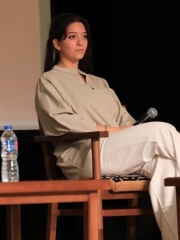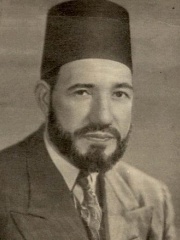
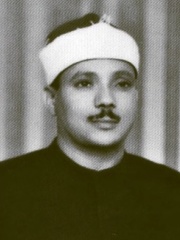
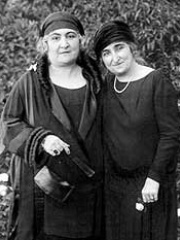
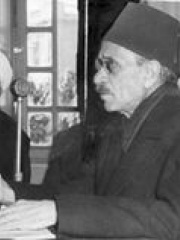
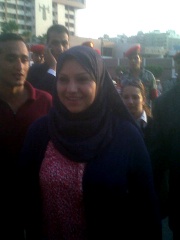
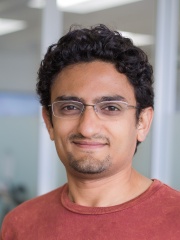
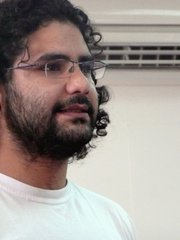
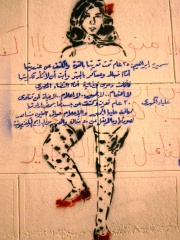
The Most Famous
SOCIAL ACTIVISTS from Egypt
This page contains a list of the greatest Egyptian Social Activists. The pantheon dataset contains 840 Social Activists, 12 of which were born in Egypt. This makes Egypt the birth place of the 18th most number of Social Activists behind Türkiye, and Afghanistan.
Top 10
The following people are considered by Pantheon to be the top 10 most legendary Egyptian Social Activists of all time. This list of famous Egyptian Social Activists is sorted by HPI (Historical Popularity Index), a metric that aggregates information on a biography's online popularity. Visit the rankings page to view the entire list of Egyptian Social Activists.

1. Hassan al-Banna (1906 - 1949)
With an HPI of 73.55, Hassan al-Banna is the most famous Egyptian Social Activist. His biography has been translated into 47 different languages on wikipedia.
Hassan Ahmed Abd al-Rahman Muhammed al-Banna (Arabic: حسن أحمد عبد الرحمن محمد البنا; 14 October 1906 – 12 February 1949), known as Hassan al-Banna (Arabic: حسن البنا), was an Egyptian schoolteacher and Imam, best known for founding the Muslim Brotherhood, one of the largest and most influential global Islamist movements, and for his death at the hands of the Egyptian government. Al-Banna's writings marked a turning-point in Islamic intellectual history by presenting a distinct and all-encompassing modern ideology based on Islam. Al-Banna considered Islam to be a comprehensive system of life, with the Quran and Sunnah as the only acceptable constitution. He called for Islamization of the state, the economy, and society. He declared that establishing a just society required development of institutions and progressive taxation, and developed an Islamic fiscal theory where zakat would be reserved for social expenditure in order to reduce inequality. Al-Banna's ideology featured criticism of Western materialism, British imperialism, and the traditionalism of the Egyptian ulema. He appealed to Egyptian and pan-Arab patriotism but rejected Arab nationalism and regarded all Muslims as members of a single nation-community. Following the abolition of the Caliphate in 1924, al-Banna called on Muslims to prepare for armed struggle against colonial rule; he warned Muslims against the "widespread belief" that "jihad of the heart" was more important than "jihad of the sword". He allowed the formation of a secret military wing within the Muslim Brotherhood, which took part in the Arab–Israeli conflict. Al-Banna generally encouraged Egyptians to abandon Western customs; and argued that the state should enforce Islamic public morality through censorship and application of hudud corporal punishment. Nonetheless, his thought was open to Western ideas and some of his writings quote European authors instead of Islamic sources. Al-Banna was assassinated by the Egyptian secret police in 1949. His son-in-law Said Ramadan emerged as a major leader of the Muslim Brotherhood in the 1950s.

2. Abdul Basit 'Abd us-Samad (1927 - 1988)
With an HPI of 68.70, Abdul Basit 'Abd us-Samad is the 2nd most famous Egyptian Social Activist. His biography has been translated into 25 different languages.
'Abdul Basit 'Abd us-Samad (1927 – 30 November 1988) was an Egyptian Quran reciter and Hafiz. He is part of a quadrumvirate, along with Siddiq Al-Minshawi, Mustafa Ismail, and Al-Hussary, which are considered to be the most important and famous Qurra of modern times to have an outsized impact on the Islamic World. He was the first president of the Reciter's union in Egypt. He is known by the titles 'Golden Throat', 'A voice from Heaven' and 'Voice of Mecca' due to his melodious style, breath control, and unique emotional and engaging tone.

3. Huda Sha'arawi (1879 - 1947)
With an HPI of 64.25, Huda Sha'arawi is the 3rd most famous Egyptian Social Activist. Her biography has been translated into 39 different languages.
Huda Sha'arawi or Hoda Sha'rawi (Arabic: هدى شعراوي, ALA-LC: Hudá Sha‘rāwī; 23 June 1879 – 12 December 1947) was a pioneering Egyptian feminist leader, suffragette, nationalist, and founder of the Egyptian Feminist Union.

4. Ahmed Lutfi el-Sayed (1872 - 1963)
With an HPI of 56.66, Ahmed Lutfi el-Sayed is the 4th most famous Egyptian Social Activist. His biography has been translated into 16 different languages.
Ahmed Lutfi el-Sayed or Aḥmad Luṭfī Sayyid Pasha (IPA: [ˈæħmæd ˈlotˤfi (ʔe)sˈsæjjed]) (15 January 1872 – 5 March 1963) was a prominent Egyptian nationalist, intellectual, anti-colonial activist and the first president of Cairo University. He was an influential person in the Egyptian nationalist movement and used his position in the media to strive and gain an independent Egypt from British rule. He was also one of the architects of modern Egyptian nationalism as well as the architect of Egyptian secularism and liberalism. He was fondly known as the "Professor of the Generation". Lutfi was one of the fiercest opponents of pan-Arabism, insisting that Egyptians are Egyptians and not Arabs. He is considered one of the most influential scholars and intellectuals in the history of Egypt.
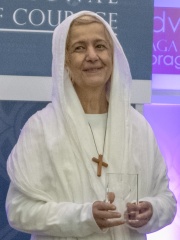
5. Maggie Gobran (b. 1949)
With an HPI of 54.16, Maggie Gobran is the 5th most famous Egyptian Social Activist. Her biography has been translated into 18 different languages.
Maggie Gobran (Arabic: ماجي جبران) or Mama Maggie is a Coptic Orthodox consecrated servant and the founder and CEO of the non-profit charity Stephen's Children in Cairo, Egypt. She was also professor of computer science at the American University in Cairo, is married and has a son and a daughter. She was nominated for Nobel Peace Prize in 2012 and 2020.

6. Asmaa Mahfouz (b. 1985)
With an HPI of 46.51, Asmaa Mahfouz is the 6th most famous Egyptian Social Activist. Her biography has been translated into 29 different languages.
Asmaa Mahfouz (Egyptian Arabic: أسماء محفوظ, pronounced [ʔæsˈmæːʔ mɑħˈfuːz, ˈʔæsmæ-], born 1 February 1985) is an Egyptian activist and one of the founders of the April 6 Youth Movement. She has been credited by journalist Mona Eltahawy and others with helping to spark a mass uprising through her video blog posted one week before the start of the 2011 Egyptian revolution. She is a prominent member of Egypt's Coalition of the Youth of the Revolution and one of the leaders of the Egyptian revolution. In 2011 she was one of five recipients of the "Sakharov Prize for Freedom of Thought", awarded for contributions to "historic changes in the Arab world". The other joint recipients were Ahmed al-Senussi, Razan Zaitouneh, Ali Farzat, and Mohamed Bouazizi of the Arab Spring. Arabian Business placed Mahfouz at #381 on its list of the World's 500 Most Influential Arabs.

7. Wael Ghonim (b. 1980)
With an HPI of 46.22, Wael Ghonim is the 7th most famous Egyptian Social Activist. His biography has been translated into 27 different languages.
Wael Ghonim (Arabic: وائل غنيم [ˈwæːʔel ɣoˈneːm]; born 23 December 1980) is an Internet activist and computer engineer with an interest in social entrepreneurship. In 2011, he became an international figure and galvanized pro-democracy demonstrations in Egypt after his emotional interview following 11 days of secret incarceration by Egyptian police. During these 11 days, he was interrogated regarding his work as one of two administrators of the Facebook page "We are all Khaled Said", which helped spark the Egyptian Revolution of 2011. Time magazine included him in its "Time 100" list of the 100 most influential people of 2011, and the World Economic Forum selected him as one of the Young Global Leaders in 2012. Ghonim is the author of Revolution 2.0: The power of people is greater than the people in power (2013). In 2012, he founded Tahrir Academy, a technology focused NGO that aims to foster education in Egypt. In 2015, Ghonim co-founded Parlio, a social media platform that was acquired by Quora in March 2016. He is currently a non-resident senior fellow at Harvard's Ash Center for Democratic Governance and Innovation.

8. Alaa Abd El-Fattah (b. 1981)
With an HPI of 45.05, Alaa Abd El-Fattah is the 8th most famous Egyptian Social Activist. His biography has been translated into 15 different languages.
Alaa Ahmed Seif al Islam Abd El-Fattah (Arabic: علاء أحمد سيف الإسلام عبد الفتاح, IPA: [ʕæˈlæːʔ ˈæħmæd ˈseːf ʕæbdelfatˈtæːħ]), known professionally as Alaa Abd El-Fattah (Arabic: علاء عبد الفتاح; born 1981), is an Egyptian-British software developer, blogger, political activist and former political prisoner. After a 2006 arrest by Egyptian police, Abd El-Fattah was released without charge 45 days later. He was imprisoned in Egypt for organising a political protest without requesting authorisation, and released on bail in March 2014. In September 2014, he was rearrested and ordered released on bail again, receiving a five-year sentence in February 2015, from which he was released in late March 2019. In September 2019, during the 2019 Egyptian protests, Abd El-Fattah was re-arrested by the National Security Agency and taken to State Security Prosecution on unknown charges. He was convicted of "spreading fake news" and jailed for five years. In April 2022, he began a hunger strike. His family claims that his sentence should have ended in September 2024. The Egyptian authorities refused to free him, as the release date had been appointed in January 2027, based on the court’s decision not to include his served pretrial detention.[citation needed] In September 2024, Abd El-Fattah's mother, Laila Soueif, began a hunger strike outside the British Foreign Office in London, remaining on strike as of 25 January 2025, when she was joined by Australian journalist Peter Greste. In October 2024, Abd El-Fattah was named by Arundhati Roy, winner of the 2024 PEN Pinter Prize awarded by English PEN, as the "Writer of Courage" with whom she chose to share the prize. On 22 September 2025, Abd El-Fattah was released from prison, after having spent most of the previous 12 years incarcerated. He was pardoned along with five other prisoners by Egyptian president Abdel Fattah el-Sisi. On 26 December, following the lifting of a travel ban, Abd El-Fattah moved to Britain. Following his arrival, he became the subject of controversy over his past social media posts. The British Prime Minister, Keir Starmer, welcomed Abd El-Fattah's return to Britain. Starmer actively campaigned and lobbied for his release, and Starmer stated that the case had been a "top priority" for his government since taking office.

9. Aliaa Magda Elmahdy (b. 1991)
With an HPI of 44.52, Aliaa Magda Elmahdy is the 9th most famous Egyptian Social Activist. Her biography has been translated into 26 different languages.
Aliaa Magda Elmahdy (Egyptian Arabic: علياء ماجدة المهدي, IPA: [ʕælˈjæːʔ ˈmæɡdæ (ʔe)lˈmæhdi, ˈʕæljæ-]; born 16 November 1991) is an Egyptian internet activist and feminist advocate. She became known for publishing a nude photo on her Blogspot page, which she described on Facebook as "screams against a society of violence, racism, sexism, sexual harassment and hypocrisy". Since then she became a subject of several death threats. Elmahdy describes herself as a "secular, liberal, feminist, vegetarian, individualist Egyptian" and has identified as an atheist since turning 16.
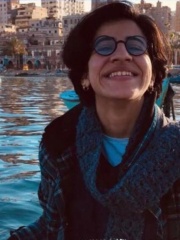
10. Sarah Hegazi (1989 - 2020)
With an HPI of 44.29, Sarah Hegazi is the 10th most famous Egyptian Social Activist. Her biography has been translated into 34 different languages.
Sarah Hegazi (Arabic: سارة حجازي; 1 October 1989 – 14 June 2020; also rendered Hegazy or Higazy) was an Egyptian writer, LGBTQ activist, and socialist. She was arrested and imprisoned in Egypt for three months after waving a rainbow flag at a Mashrou' Leila concert in 2017 in Cairo. Hegazi subsequently suffered from post-traumatic stress disorder (PTSD) as a result of the torture she endured in prison. She committed suicide in June 2020.
People
Pantheon has 12 people classified as Egyptian social activists born between 1872 and 1998. Of these 12, 7 (58.33%) of them are still alive today. The most famous living Egyptian social activists include Maggie Gobran, Asmaa Mahfouz, and Wael Ghonim. The most famous deceased Egyptian social activists include Hassan al-Banna, Abdul Basit 'Abd us-Samad, and Huda Sha'arawi. As of April 2024, 2 new Egyptian social activists have been added to Pantheon including Alaa Abd El-Fattah, and Mona Seif.
Living Egyptian Social Activists
Go to all RankingsMaggie Gobran
1949 - Present
HPI: 54.16
Asmaa Mahfouz
1985 - Present
HPI: 46.51
Wael Ghonim
1980 - Present
HPI: 46.22
Alaa Abd El-Fattah
1981 - Present
HPI: 45.05
Aliaa Magda Elmahdy
1991 - Present
HPI: 44.52
Mona Seif
1986 - Present
HPI: 36.65
Nadeen Ashraf
1998 - Present
HPI: 27.44
Deceased Egyptian Social Activists
Go to all RankingsHassan al-Banna
1906 - 1949
HPI: 73.55
Abdul Basit 'Abd us-Samad
1927 - 1988
HPI: 68.70
Huda Sha'arawi
1879 - 1947
HPI: 64.25
Ahmed Lutfi el-Sayed
1872 - 1963
HPI: 56.66
Sarah Hegazi
1989 - 2020
HPI: 44.29
Newly Added Egyptian Social Activists (2025)
Go to all RankingsOverlapping Lives
Which Social Activists were alive at the same time? This visualization shows the lifespans of the 5 most globally memorable Social Activists since 1700.


